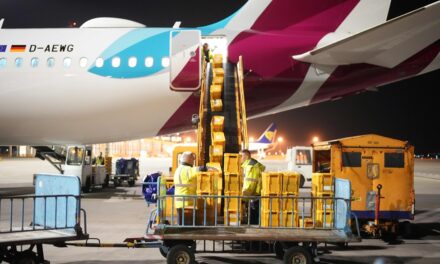
Deutsche Post worldwide still aiming for the summit
When Deutsche Post said yesterday it would buy the ground operations of Airborne, the third-largest US air express delivery company, for $1.05bn, the German postal operator closed a hole in its ability to deliver ground packages in the US and caught up with United Parcel Service and FedEx, two of its fiercest rivals.
The move marked the latest triumph for Klaus Zumwinkel, Deutsche Post's chief executive. Airborne, Mr Zumwinkel said, would be another step towards transforming the once-creaky state monopoly into the world's top logistics group.
But observers worry that Deutsche Post may stretch itself thin as it shops around. They argue it should focus on integrating a global network of mail, express and logistics services after a €6bn ($6.4bn) acquisition spree in recent years.
"Integrating the different business areas still offers a large potential for making better use of its existing resources and cross-selling," says Jochen Rothenbacher at equinet, a Frankfurt bank.
In November, Deutsche Post promised to pause and concentrate on integrating all divisions under DHL. Dubbed STAR, the restructuring programme aims to boost operating profit by 40 per cent by 2005 – a necessity given Deutsche Post's thin profit margins compared with UPS, FedEx and Dutch-based TPG.
But Mr Zumwinkel is not slowing down. On Monday, Deutsche Post said it paid €247m for the remaining 50 per cent in Securicor's parcel business. In mid-February, Mr Zumwinkel bought a 5 per cent stake in Sinotrans, a Chinese logistics company. He has earmarked another €800m for logistics investments in Asia and €1bn for acquisitions in European letter markets.
Others, meanwhile, welcome the group's stubborn determination to grab opportunities as they arise and fill missing pieces in the puzzle. "Deutsche Post has long said that it is weak in US ground delivery," says Martina Jung at Bankhaus Metzler. "If you want to attack UPS and FedEx, it makes sense to do it with Airborne."
Although Airborne is still a small part of the US package delivery market, owning 19 per cent of the overnight delivery segment but just 2 per cent of the ground package sector, combining it with DHL will create a formidable third competitor after UPS and FedEx. Airborne has always been considered a cheaper alternative to shipping UPS or FedEx.
Deutsche Post will pay $21.25, or €19.88 for each Airborne share, marking a 30 per cent premium to Friday's closing price. Airborne has about €100m in debt. The deal is expected to close this summer.
To circumvent federal laws that prohibit more than 25 per cent foreign ownership of US airlines, Airborne's air fleet will become a separate company known as ABX Air. "The airline subsidiary will become a stand-alone company and DHL would be the largest customer of that company," said Carl Donaway, chief executive of Airborne.
Nevertheless, worries remain whether FedEx and UPS may raise complaints over the deal. DHL Worldwide, a Deutsche Post unit, is under public scrutiny over its close ties with DHL Airways, a Chicago carrier.
Meanwhile, rating agencies are concerned. So far, Deutsche Post has taken lightly complaints that it was overpaying for Airborne. While Deutsche Post's profitable monopoly letter business still generates €3bn in annual cashflow, the group's net debt stood at €3.8bn at the end of 2002.
Following the deal with Airborne, Fitch put Deutsche Post on rating watch negative. "Deutsche Post's further rise in debt to acquire Airborne has adversely affected the group's prospective leverage and coverage ratios," Fitch said.
In February, Standard & Poor's had already placed Deutsche Post on rating watch negative, blaming unfunded pension provisions of about €6.1bn.













